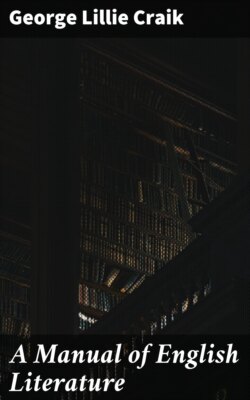Читать книгу A Manual of English Literature - George Lillie Craik - Страница 16
На сайте Литреса книга снята с продажи.
Rise of the Scholastic Philosophy.
ОглавлениеAt this time those branches of literary and scientific knowledge which were specially denominated the arts were considered as divided into two great classes,—the first or more elementary of which, comprehending Grammar, Rhetoric, and Logic, was called the Trivium; the second, comprehending Music, Arithmetic, Geometry, and Astronomy, the Quadrivium. The seven arts, so classified, used to be thus enumerated in a Latin hexameter:—
| Lingua, Tropus, Ratio, Numerus, Tonus, Angulus, Astra: |
or, with definitions subjoined, in two still more singularly constructed verses,—
| Gram. loquitur, Dia. vera docet, Rhet. verba colorat, Mus. cadit, Ar. numerat, Geo. ponderat, Ast. colit astra. |
John of Salisbury speaks of this system of the sciences as an ancient one in his day. “The Trivium and Quadrivium,” he says, in his work entitled Metalogicus, “were so much admired by our ancestors in former ages, that they imagined they comprehended all wisdom and learning, and were sufficient for the solution of all questions and the removing of all difficulties; for whoever understood the Trivium could explain all manner of books without a teacher; but he who was farther advanced, and was master also of the Quadrivium, could answer all questions and unfold all the secrets of nature.” The present age, however, had outgrown the simplicity of this arrangement; and various new studies had been added to the ancient seven, as necessary to complete the circle of the sciences and the curriculum of a liberal education.
It was now, in particular, that Theology first came to be ranked as a science. This was the age of St. Bernard, the last of the Fathers, and of Peter Lombard, the first of the Schoolmen. The distinction between these two classes of writers is, that the latter do, and the former do not, treat their subject in a systematizing spirit. The change was the consequence of the cultivation of the Aristotelian logic and metaphysics. When these studies were first introduced into the schools of the West, they were wholly unconnected with theology. But, especially at a time when all the learned were churchmen, it was impossible that the great instrument of thought and reasoning could long remain unapplied to the most important of all the subjects of thought—the subject of religion. It has already been remarked that John Erigena and other Irish divines introduced philosophy and metaphysics into the discussion of questions of religion as early as the ninth century; and they are consequently entitled to be regarded as having first set the example of the method afterwards pursued by the schoolmen. But, although the influence of their writings may probably be traced in preparing the way for the introduction of the scholastic system, and also, afterwards, perhaps, in modifying its spirit, that system was derived immediately, in the shape in which it appeared in the eleventh and twelfth centuries, from another source. Erigena was a Platonist; the spirit of his philosophy was that of the school of Alexandria. But the first schoolmen, properly so called, were Aristotelians: they drew their logic and metaphysics originally from the Latin translations of the works of Aristotle made from the Arabic. And they may also have been indebted for some of their views to the commentaries of the Arabic doctors. But, whether they took their method of philosophy entirely from the ancient heathen sage, or in part from his modern Mahomedan interpreters and illustrators, it could in neither case have had at first any necessary or natural alliance with Christianity. Yet it very soon, as we have said, formed this alliance. Both Lanfranc and Anselm, although not commonly reckoned among the schoolmen, were imbued with the spirit of the new learning, and it is infused throughout their theological writings. Abelard soon after, before he was yet a churchman, may almost be considered to have wielded it as a weapon of scepticism. Even so used, however, religion was still the subject to which it was applied. At last came Peter Lombard, who, by the publication, about the middle of the twelfth century, of his celebrated Four Books of Sentences, properly founded the system of what is called the Scholastic Theology. The schoolmen, from the Master of the Sentences, as Lombard was designated, down to Francis Suarez, who died after the commencement of the seventeenth century, were all theologians. Although, however, religious speculation was the field of thought upon which the spirit of the Aristotelian philosophy chiefly expended itself, there was scarcely any one of the arts or sciences upon which it did not in some degree seize. The scholastic logic became the universal instrument of thought and study: every branch of human learning was attempted to be pursued by its assistance; and most branches were more or less affected by its influence in regard to the forms which they assumed.
